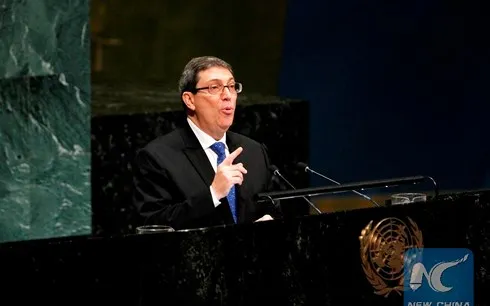Cụ thể, ngoài hai nước Ukraine và Moldova không bỏ phiếu, chỉ có Mỹ và Israel bỏ phiếu chống, còn lại 189 quốc gia bỏ phiếu thuận tình với nghị quyết phản đối lệnh cấm vận của Mỹ. Tuy nhiên, kết quả bỏ phiếu này có thể có sức nặng về mặt chính trị, nhưng chỉ Quốc hội Mỹ mới có quyền quyết định gỡ bỏ lệnh cấm vận Mỹ đã áp đặt lên Cuba trong hơn 50 năm qua.
Phát biểu trước Đại hội đồng Liên Hiệp Quốc, Đại sứ Mỹ tại Liên Hiệp Quốc Nikki Haley cho biết nghị quyết này không có tác dụng đối với Mỹ mà chỉ khiến người dân Cuba tổn thương về cách họ bị đối xử trong nước.
Mỹ vẫn liên tục bỏ phiếu phản đối nghị quyết của LHQ kêu gọi gỡ bỏ cấm vận với Cuba trong 24 năm, nhưng lần đầu tiên nước này bỏ phiếu trắng năm 2016 dưới thời cầm quyền của cựu tổng thống Barack Obama, khi Washington và Havana có được quan hệ gần gũi hơn.
Tuy nhiên mối quan hệ này xấu đi đáng kể kể từ khi ông Trump lên nắm quyền vào tháng 1/2017. Mỹ và Cuba dường như quay trở lại thời kỳ "Chiến tranh lạnh" với động thái siết chặt lại những hạn chế về du lịch và thương mại từ Chính phủ Mỹ, vốn từng được nới lỏng dưới thời ông Obama.

Ngoại trưởng Cuba Bruno Rodriguez phát biểu tại cuộc họp Đại hội đồng Liên Hợp Quốc ở New York, ngày 1/11 (Ảnh: Tân Hoa xã)
Năm nay, Hoa Kỳ đã đề xuất 8 sửa đổi nghị quyết, trong đó kêu gọi Cuba "chấp thuận hoàn toàn cho công dân của mình được công nhận các quyền tự do về dân sự, chính trị và kinh tế; cụ thể bao gồm tự do hội họp, tự do ngôn luận và tự do tiếp cận thông tin."
Mặc dù vậy, tất cả các đề xuất sửa đổi đều không thành công bởi hơn 113 quốc gia đã bỏ phiếu chống, 65 quốc gia bỏ phiếu trắng. Chỉ có Hoa Kỳ, Israel và Ukraine bỏ phiếu ủng hộ tất cả 8 sửa đổi trên.
Ngoại trưởng Cuba Bruno Rodriguez nhấn mạnh, chính phủ Mỹ không đủ thẩm quyền đạo đức để chỉ trích Cuba và các nước khác về nhân quyền. Ông cũng cáo buộc lệnh cấm vận của Mỹ là sự vi phạm các mục đích và quy tắc của Hiến chương Liên Hiệp Quốc và luật pháp quốc tế.
Ngoại trưởng Bruno cho rằng lệnh cấm vận của Mỹ là hành động gây hấn và chiến tranh kinh tế, làm gián đoạn hòa bình và trật tự quốc tế.
Tháng trước, Mỹ đã phát động một chiến dịch về tù nhân chính trị Cuba tại Liên Hiệp Quốc. Chiến dịch gây ra làn sóng phản đối dữ dội từ các nhà ngoại giao Cuba và Bolivia.
U.N. urges end to U.S. embargo on Cuba, U.S. raises rights concerns
(Reuters) - The United Nations General Assembly overwhelmingly adopted its 27th annual resolution calling for an end to the U.S. economic embargo on Cuba after a failed bid by Washington to amend the text to push Cuba to improve its human rights record.
The U.N. vote can carry political weight, but only the U.S. Congress can lift the more than 50-year-old embargo. The United States and Israel voted against the resolution, 189 countries voted in favor and Ukraine and Moldova did not vote.
U.S. Ambassador to the United Nations Nikki Haley told the General Assembly that the resolution was an opportunity for countries “to feel they can poke the United States in the eye.”
“But you’re not hurting the United States when you do this. You are literally hurting the Cuban people by telling the regime that their treatment of their people is acceptable,” she said ahead of the vote.
The United States consistently voted against the U.N. resolutions for 24 years but abstained for the first time in 2016 under former President Barack Obama, as Washington and Havana forged a closer relationship.
But relations have deteriorated sharply since President Donald Trump took office in January 2017, returning to Cold War characterizations of Cuba and tightening trade and travel restrictions that had been eased by Obama.
The United States voted against the U.N. resolution last year along with its ally Israel. The General Assembly’s remaining 191 members voted in favor.
This year, the United States proposed eight amendments to the resolution, including calling on Cuba to “fully grant its citizens internationally recognized civil, political and economic rights and freedoms, including freedom of assembly, freedom of expression and free access to information.”
But all of the amendments failed after more than 113 countries voted against them. Only the United States, Israel and Ukraine voted in favor of all eight amendments. More than 65 countries abstained.
Cuban Foreign Minister Bruno Rodriguez said on Thursday the U.S. government lacked the “moral authority” to criticize Cuba and others on human rights.
“The embargo is a violation of the purposes and principles of the Charter of the United Nations and of international law,” he said before the vote. “It is an act of aggression and an act of economic war, which disrupts international peace and order.”
Last month, the United States launched a campaign at the United Nations that it said was designed to highlight the plight of Cuban political prisoners. Protesting Cuban and Bolivian diplomats drowned out the launch by shouting, chanting and banging their hands on desks.



